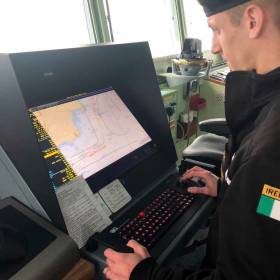Displaying items by tag: Paperless Navigation
Irish Naval Service Flagship First to Achieve "Paperless Navigation”
#NavalService - The Irish Naval Service flagship LÉ Eithne has recently been accredited as the first in the fleet to achieve "paperless navigation” writes Jehan Ashmore
The 1984 custom-built P30 class Helicopter Patrol Vessel (HPV), Afloat adds notably the last Irish built vessel for the Naval Service and of any ship in the Republic, now has Warship Electronic Chart Display and Information System (WECDIS).
The milestone took place this day last week, where the electronic systems according to the INS will greatly enhance navigation safety, situation awareness & tactical planning capabilities.
L.É Eithne is in the same company of the ageing P40's Coastal Patrol Vessel (CPV) pair, L.É. Orla and L.É. Ciara which also date to 1984, though they were originally commissioned for the UK Royal Navy.
The remaining patrol vessels of the fleet are all Offshore Patrol Vessels (OPV), beginning with the elder pair of P50 Róisín class L.É. Róisín and L.É Niamh, the latter completed in 2000. The reference to '80' refers to the length overall (LOA) of each of the sisters built by Appledore Shipbuilders, north Devon.
They are to recieve mid-life extension survey refits involving a Scottish marine consultancy firm.
A further trio, known as enhanced Róisín class followed suit, again from the same UK shipbuilder site but under management of Babcock Marine. They are the P60 OPV90's L.É. Samuel Beckett, James Joyce and William Butler Yeats.
The latest newbuild, again a OPV90 class, L.É. George Bernard Shaw was completed this year, though it would appear that the 2,250 tonnes vessel is the final to be built at the yard, following announcement of closure.
L.É. George Bernard Shaw is currently not part of the 8-strong fleet. As reported earlier this year, the €67m OPV newbuild is according to the IDF to be formally named and officially commissioned into the Naval Service this year.
Plans are afoot to replace LÉ Eithne with a new Multi Role Vessel MRV (a first for the INS), following the Budget, where total Defence spending across the three branch forces (air corps, army and navy) is to increase to €946m next year.






























































